World Hockey Summit: Day 3
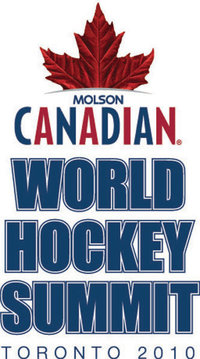 Debate over the National Hockey League’s role in international hockey, especially the Winter Olympics, built to a crescendo at the World Hockey Summit yesterday.
Debate over the National Hockey League’s role in international hockey, especially the Winter Olympics, built to a crescendo at the World Hockey Summit yesterday.
International Ice Hockey Federation President Rene Fasel had started thumping the war drums on Tuesday when he warned the NHL that they would expand to Europe “over his dead body”.
During that same question and answer session with TSN’s Gord Miller he called for professional hockey players to play at the 2014 Winter Olympics at Sochi, Russia.
Wednesday morning there was an evaluation of the 2010 Olympics, with Fasel, Vancouver Organizing Committee CEO John Furlong and International OIympic Committee member Timo Lumme speaking about the great success and popularity of hockey at this year's Games.
All three emphasized that the 114 million worldwide viewers of the USA-Canada men’s hockey final had been drawn, in part, by the fact that it was a best-on-best game that featured NHLers.
After the keynotes were done, Miller, acting as moderator, allowed IIHF member Igor Kuperman, sports marketing guru Brian Cooper, Detroit Red Wings general manager Ken Holland, Ottawa Senators captain Daniel Alfredsson and New Jersey Devils captain Jamie Langenbrunner to respond.
Not surprisingly, all five panellists supported the NHL’s return to the Olympics, with only Holland showing any kind of hesitation. The successful GM had many concerns about scheduling and injury issues affecting the success and health of his professional club.
When discussion broke out amongst the hundreds of delegates in attendance, there was an easy consensus that the NHL and Olympics need each other for the fans and the good of the game.
After lunch, NHL Commissioner Gary Bettman had a Q+A with TSN’s Pierre Maguire. During the interview Bettman repeatedly said there were pros and cons to sending his players to Sochi.
“We haven’t said ‘no,’” said Bettman. “And anybody who suggests that we’ve made a decision or suggests I’m anti-Olympics doesn’t get it, because what we’ve been simply saying is, ‘it’s a mixed bag.’”
Bettman stressed that he was commissioner when the NHL first started playing in the Olympics at Nagano, Japan, four cycles ago and that he has always been interested in exposing the sport to as many people as possible.
Many had expected that Bettman’s half-hour session was going to be the most heated event of the day. However, it was the follow-up discussion of a Global Event Agenda that was really contentious.
Moderated by Darren Dreger, the panel began with a thoughtful presentation by Edmonton Oilers associate coach Ralph Krueger, who had served as head coach of the Swiss national team at the Vancouver Olympics.
Krueger proposed a new schedule for international events, featuring the Olympics every four years, a World Hockey Championship during the intervening years and an under-23 world championship during Olympic years.
He also suggested that the Victoria Cup, an annual club championship between two European teams and two NHL teams, should be revived.
Miller then opened the floor to the panel of NHL Deputy Commissioner Bill Daly, Kontinental Hockey League President Alexander Medvedev, Team USA and Toronto Maple Leafs GM Brian Burke, NHL alum Anders Hedberg, former NHL goaltender and prominent NHLPA member Glenn Healy, NHLPA representative Mike Ouellet and IIHF member and broadcaster Paul Romanuk.
Although things began reasonably as each panellist said their piece, Fireworks ensued when they had the chance to rebut each other.
Generally speaking, Burke and Daly presented the case for the NHL staying out of the Olympics, highlighting that it put teams’ assets – the players – at considerable risk of injury. They were also concerned that the interruption in the professional season damaged the momentum of small-market teams.
“The Olympics don’t hurt the Toronto Maple Leafs, it doesn’t hurt our business model,” said Burke, the former GM of the Mighty Ducks. “But in Anaheim it does. In Nashville, it does. In Florida, it does.”
They were opposed by Healy and Ouellet, who as representatives of the players’ association, felt that their constituency should be allowed to play when and where they wanted, and that practically all NHLers would love to play at the Olympics.
Panellists outside of the labour politics of the NHL like Medvedev, Hedberg and Romanuk also chimed in with their concerns, although all three were adamant that the Olympics should be a “best-on-best” tournament.
The debate laid bare many of the tensions at the highest levels of hockey.
Everything from the ongoing labour disputes between the NHL and NHLPA, the lack of communication between the NHL and IIHF, the competing styles and values of European and North American hockey as well as the emergence of the KHL as a threat to NHL supremacy were all on display.
There were many dramatic moments, including Healy wondering aloud why Burke cared so much about when the World Hockey Championships were scheduled, since the Maple Leafs are always available when the tournament begins in April.
Alliances also shifted quickly in the swirling debate. When a doctor from the IIHF spoke from the floor to correct Healy’s impression that the quality of medical care provided at the Olympics is sub-par, the former Toronto goaltender saw his nemesis Burke leap to his defence.
Similarly, when another delegate called out Burke and Daly saying that it was a simple issue and that he was sick of hearing excuses about NHLers playing in the Olympics, Ouellet and Healy both allowed that it was a complex issue.
Burke was the most energetic debater throughout, taking on all comers from the stage and the floor of delegates, although Daly, Ouellet and Healy were very active as well. It was an exciting and intriguing show that had delegates buzzing for the rest of the day.
Today’s topics will be Women’s Hockey in the morning and Growing Participation. It’s hard to imagine that those panels will be nearly as heated, but you never know.
Paralympics off to a poor start before they can even begin
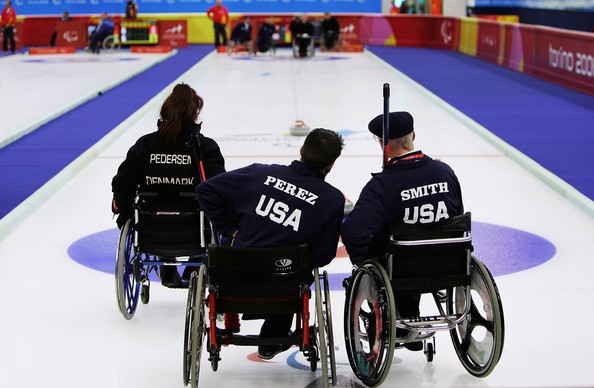 In the wake of the very successful Vancouver Olympics there’s a nice afterglow surrounding Canada’s amateur sports. Events like downhill skiing and curling are given more prominent airtime on television and commentators like ESPN’s Bill Simmons are still talking about the 2010 Games.
In the wake of the very successful Vancouver Olympics there’s a nice afterglow surrounding Canada’s amateur sports. Events like downhill skiing and curling are given more prominent airtime on television and commentators like ESPN’s Bill Simmons are still talking about the 2010 Games.
It’s little wonder. After all, Canada finally got the monkey off its back when Alex Bilodeau won a gold medal, the first time a Canadian has won the top prize on home soil. Canadians then went on to win 13 more gold medals, an Olympic record for the host nation of a winter games, culminating in a dramatic 3-2 overtime victory over Team USA in men’s hockey.
The closing ceremonies struck the right note as well. It was funny, charming and distinctly Canadian, provided you turned the TV off as soon as Nickleback took to the stage.
But all that goodwill is going to be wasted by tonight’s Paralympic Opening Ceremony which you will be able to watch.... nowhere. See, neither CTV or NBC are showing the ceremony live. Instead, they’re going to air the “hit” TV show, Medium, and run the tape of the ceremonies on Saturday.
I understand that the Paralympics don’t have all the glitz and glamour of National Hockey League players or the sex appeal of Lindsay Vonn or the Curlougar Cheryl Bernard, but surely they deserve to have their opening ceremonies live to air.
Can the demand for the latest and greatest episode of Medium really be that high?
To me, the Paralympics do way more to capture the spirit of the Olympics Movement. Their precursor was the Stoke Mandeville Games, organized by Dr. Ludwig Guttmann in 1948 during the London Olympic Games. Orginally, they were an exercise for British World War II veterans with spinal conditions. The hope was that the competition would motivate them to stay active despite their handicap.
The first official Paralympics were held after the 1960 Olympics in Rome with a broadened scope that included anyone with a physical disability or vision impairment. They focused on the participants’ athletic achievements and fitness for the physically disabled around the world.
That is what the Olympics should be all about – the triumph of the human spirit, creating new heroes that people around the world can admire for their determination and will power. It’s a real shame that CTV and NBC have forgotten that lesson just two weekends after the Olympics ended.
Canada/USA has made me into a fan of women’s hockey
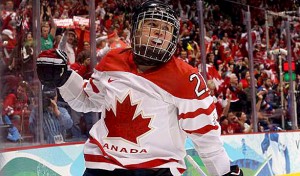 I am embarrassed to admit that last night was the first time I have ever watched a women’s hockey game from start to finish. A terrible sin, I know.
I am embarrassed to admit that last night was the first time I have ever watched a women’s hockey game from start to finish. A terrible sin, I know.
I had seen periods from games or seen bits and pieces, but for a host of reasons I’ve never been able to sit and watch a women’s game to completion. But I’m glad I finally did.
It was the perfect game to watch as Canada held on to an early 2-0 lead to down their arch-rivals from the United States and win their third consecutive Olympic gold medal.
There was a lot to like about the match-up. As the prohibitive favourites in any international tournament, the North American teams had often locked up at the highest levels of competition, whether at the Olympics or World Championships. As a result, the two teams are very familiar with each other’s tactics and strategies.
It quickly became apparent that women’s hockey has a style all its own thanks largely to the prohibition of body checking.
Personally, I’ve always thought this was a sexist rule that implied that women were too fragile to withstand physical play. It just made no sense – why could a woman not safely hit another woman? They would be physical equals, with no particular danger of injury.
However, the lack of big hits means that the scourge of entertaining hockey – the Trap – is impossible. The resulting game is fast and free-flowing with few stops in play. It’s refreshing compared to the National Hockey League where clogging the neutral zone has often been the fastest way to the playoffs.
The players on both teams were exceptional passers and play makers. Throughout the game there were creative tape-to-tape passes generating scoring chances. The Canadians in particular had a knack for finding each other on the ice.
When they had those openings, the Canadians were patient, waiting for defenders to over-commit themselves to a blocked shot. Canada often exploited their opponents’ mistake with a sharp pass for another quality chance. It was inspiring hockey.
Team Canada was also impressively dedicated to defence, dropping to their knees to block shots and passes, fending off a 5-on-3 power play for nearly a minute and a half at the start of the second period.
It was a lot of fun to watch, with both teams evenly matched.
That said, I don’t regret missing any of their other games. They were all lopsided blowouts that made me feel bad for the have-nots in women’s hockey. This is the sport’s greatest weakness – only a Canada-USA match-up showcases the very best of the game. Every other pairing is horribly one-sided.
When the next world championship rolls around, I’ll make sure to watch – as long as the game has Canada and the USA in it.
A side note: The fact that Team Canada had to apologize for their celebratory drinks and cigars on the ice is utter nonsense. The arena had emptied out and they were revelling in their success in what should have been a private moment. They should be allowed to let their hair down, guilt free.
I won’t go on any further, as too much ink has already been spilled over this story.
In Defence of Own the Podium
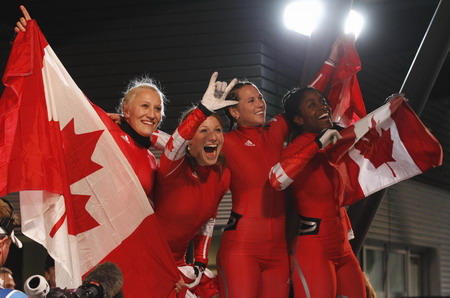 Wednesday was Canada’s best day for Olympic medals, with the teams of Kaillie Humphries/Heather Moyes and Helen Upperton/Shelley-Ann Brown winning gold and silver in a 1-2 punch in women’s two-person bobsleigh. The women's 5,000 metre speed skating relay team earned a silver medal. Adding to the medal haul was Clara Hughes, who earned her sixth career Olympic medal, a bronze in 5000m long track speed skating.
Wednesday was Canada’s best day for Olympic medals, with the teams of Kaillie Humphries/Heather Moyes and Helen Upperton/Shelley-Ann Brown winning gold and silver in a 1-2 punch in women’s two-person bobsleigh. The women's 5,000 metre speed skating relay team earned a silver medal. Adding to the medal haul was Clara Hughes, who earned her sixth career Olympic medal, a bronze in 5000m long track speed skating.
Although Team Canada’s 7-3 thrashing of the Russian Federation grabbed all the headlines, it was a banner day for Canada’s less glamorous Olympic sports that may have helped justify the Canadian Olympic Committee’s controversial Own the Podium program, just as it appears to be on its last legs.
Designed to give Canada the highest medal count at the 2010 Vancouver games, the Own the Podium program increased spending on winter Olympic sports by $21-million annually over the course of five years, with money coming from provincial and federal governments as well as private sponsors like Bell Canada. The goal was for Canada to earn a total of 35 podium finishes.
This plan has drawn criticism from all corners. Other countries (particularly the British media) have described it as an “un-Canadian” initiative. Apparently, it’s against the national character to be competitive in anything other than men’s hockey. A proposterous claim given that the Olympics, by definition, is about pushing the envelope and achieving new heights.
At the same time, some domestic media were unhappy that so much public funding - $118 million in total – was being spent on athletics when it could be applied to pressing issues like education, health care or the flagging economy.
As of this writing, Canada has stepped on to the podium 15 times, and might finish in the top three in men and women’s hockey, men and women’s curling and speed skating. Realistically, Canada will finish with around 20 medals, just shy of their 2006 Turin total of 24, and well short of Own the Podium’s stated goal of 35. On Monday, the COC announced that it was no longer aiming to top the medal tables at Vancouver.
In other words, CEO Roger Jackson and his staff have disappointed just about everybody, except the athletes.
Although the program has not met expectations, I think that in the long run it will make Canada into a more formidable sporting nation. At long last, Canadian athletes are getting the support they so richly deserve, allowing them to finally put their best foot forward in international competition.
Their performance at the Vancouver games will serve as an inspiration to Canada’s youth, spawning a new generation of world-class athletes. Yes, the money could have been spent on other projects, but giving Canadian children role models to look up to is certainly a worthy pursuit.
Further, this initiative is just catching Canada up to the rest of the world. In many cases, the athletes from other nations in the winter Olympics are members of the military.
For example, Tuffy LaTour, the coach of Canadian men’s bobsleigh team, is a retired army sergeant from the United States who competed with the American military’s sledding team.
Dan Humphries, the husband of Canadian gold medalist Kaillie Humphries, and a member of Canada’s four-man bobsleigh team, was originally a member of the British Army’s slidding team.
Heck, Finland won the Winter War against the Soviet Union by their superior biathlon skills.
Canada, with its significantly smaller population and military complex, needs a boost to its athletics programs, and Own the Podium is it.
Just as the Calgary Olympics created a home base for Canadian sports, the combination of the Vancouver games and Own the Podium will start a new golden age in the Canadian Olympic movement. It appears as though most of Own the Podium's sponsors, both public and private, will stop funding after the closing ceremonies this weekend, which would be a shame.
Three ice dancing performances I’d like to see
Like many Canadians, I was thrilled by Tessa Virtue and Scott Moir’s gold medal ice dance performance on Monday night.
I would never call myself a figure skating or ice dancing fan – I find that too often the judge’s decisions are political – but I was impressed with the athleticism and technique of all the dancers in the competition.
What did not impress me was their lack of creativity or originality. Most of the performances bled together. Virtue and Moir stood above the rest of the competition because they didn’t rely on clichéd music like the themes from the Phantom of the Opera or Requiem for a Dream. They weren’t covered with sequins and feathers. Their performance truly distinguished them from the rest of the pack.
As I was watching all the performances roll off the assembly line, I couldn’t help but come up with ideas of my own. Not necessarily for me to perform since I’m a terrible skater, but ideas that talented ice dancers could use to blow away the judges and competition. Here are my top three:
Super Mario Brothers -Mario and Princess Peach.
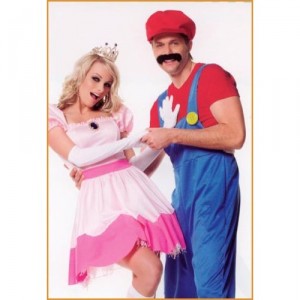 The pinnacle of video game romance, Super Mario’s quest to save his true love, Princess Peach, is timeless and crosses all cultures. Their tale of love denied has ties to Japan, Italy and North America and would undoubtedly hold appeal to judges from many nations.
The pinnacle of video game romance, Super Mario’s quest to save his true love, Princess Peach, is timeless and crosses all cultures. Their tale of love denied has ties to Japan, Italy and North America and would undoubtedly hold appeal to judges from many nations.
The music is all there too. Obviously, the symphonic version of the Mario theme is a good starting place, but if the performers want to make things a little more contemporary theys can break it down and use a medley that incorporates DJ Clue’s remix of the classic 8-bit song.
The costumes are easy too – the male dancer would wear red overalls, a red newsie cap, white gloves and a giant fake moustache. Princess Peach’s costume is even easier, since most figure skaters already wear giant pink dresses and crowns. The one adjustment is that for safety reasons the ice dancer’s costume would need a shorter skirt then the Princess’ traditional ball gown.
After all that preparation the performance will write itself. Trust me.
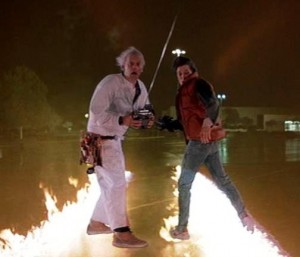 Back to the Future – Marty McFly and Doc Brown.
Back to the Future – Marty McFly and Doc Brown.
Not a love story necessarily, but Marty McFly and Doc Brown have one of the best bromances in movie history.
The strength of the Back to the Future pairing is that the music would blow the competition away. Nothing could top Huey Lewis’ "Power of Love" for the short program (complete with air guitar) followed by Alan Silvestri’s Back to the Future theme for the long performance.
The biggest problem with this program, of course, is that both characters are male. However, a petite brunette with short cropped hair could easily play Marty McFly. Tight jeans, a denim shirt and McFly’s trademark red vest would complete the ensemble. A big white wig and flowing lab coat would transform the male dancer into Doc Brown, and your theme is complete.
Liberal use of a fog machine, and perhaps a Delorian door for the ice pad’s entrance would complete the performance and a much needed sense of adventure to the proceedings. I have it on good authority that you don’t need money, you don’t need fame, you don’t need no credit card to ride the Olympics train.
Star Wars – C3PO and R2D2
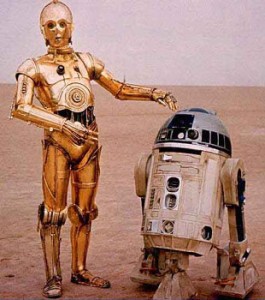 Yes, there are more traditional romantic pairings like Han Solo and Leia Organa, while Luke Skywalker and Princess Leia could appeal to those icky brother-sister ice pairs like Russians Roman and Alexandra Zaretsky or Brits Sinead and John Kerr. However, for my money, the best couple in the Star Wars movies are C3PO and R2D2. They stick together no matter what and have exceptional teamwork. Aren’t those ideal traits for an Olympic-calibre performance?
Yes, there are more traditional romantic pairings like Han Solo and Leia Organa, while Luke Skywalker and Princess Leia could appeal to those icky brother-sister ice pairs like Russians Roman and Alexandra Zaretsky or Brits Sinead and John Kerr. However, for my money, the best couple in the Star Wars movies are C3PO and R2D2. They stick together no matter what and have exceptional teamwork. Aren’t those ideal traits for an Olympic-calibre performance?
Also, the music is a slam dunk. John Williams’ score from the Star Wars movies is one of the most recognizable pieces of classical work and is suitably epic for an ice dancing performance.
I would make my performance an interpretation of the Droid’s journey, beginning with their escape from the Blockade Runner in A New Hope. A bold coach might even incorporate Leia’s desperate holographic message to the Rebel Alliance. As the dancers flee from corner to corner of the ice, extras in Stormtrooper outfits could emerge from the audience to wildly fire blasters at them. It’d be exciting and allow the dancers to display all their most graceful tricks.
The one drawback of this piece would be the construction of R2D2’s outfit. However, I’m sure a talented costume designer could tackle the project and the result would be more dignified then dressing as a tree or performing to Linkin Park’s "Crawling".
Midterm report on CTV’s Olympics coverage
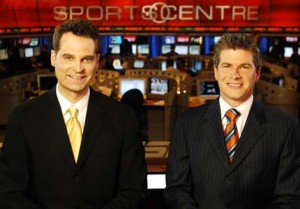
TSN's Jay Onrait (left) and Dan O'Toole have been just two of the highlights of the Consortium's Olympic coverage.
Whether it’s bitter Australians or sniping Brits, the 2010 Olympics media coverage has become a story unto itself, becoming a sideshow to the actual competition.
In Canada, the media controversy du jour is that the Olympics are being covered by the Consortium - a group of companies that includes CTV, the Globe and Mail, Rogers and my employers, the Canadian Press amongst many others – and not the Canadian Broadcasting Corporation. Many people have criticized CTV’s coverage, saying that the CBC is the broadcaster of choice. Personally, I’m not so sure.
Student of Canadian television that I am, I think it’s time to see just how CTV’s posse has been doing.
PROS -
More channels, more sports. The CTV/CHUM/City/Rogers hydra has six channels available for Olympics broadcasting, meaning that there is no need for anyone to miss their favourite event. They’ve also done a good job of rolling a banner out informing the viewers when other events are starting on other channels.
This isn’t just good for the viewers, it’s good for the sports. Events like women’s hockey are getting more exposure than ever before, and it’s actually possible to watch an entire day’s worth of competition without the feed switching to biathlon or something.
Hopefully this means that in the long run we’ll see growth in sports that have suffered on the fringes of cable television.
APTN. One of the channels in the Consortium is the Aboriginal People’s Television Network, a channel up in the high stratosphere of cable TV. They haven’t been given the biggest events to cover, but the fact that they’re providing coverage specifically for Canada’s First Nations is admirable.
Many Canadian athletes are of native descent, and having a dedicated Olympic channel that caters to them is long overdue. Hopefully, they’ll maintain their license for the foreseeable future.
James Duthie. Okay, not just Duthie, but many members of the TSN crew. Anchors like Dan O’Toole, Bryan Mudryk and Jay Onrait have been given a bigger stage to perform on, and they’ve done a fantastic job of keeping even mundane recaps entertaining.
Too often the Olympics are sincere to the point of being maudlin and these four TSN veterans have injected a much-needed sense of fun to the proceedings.
Duthie in particular, has used his dry wit to great effect. The lead-up to the opening ceremonies stands out. When everyone else seemed dazzled by the spotlight, Duthie was quipping about Brian Williams and Lloyd Robertson doing body shots together. It’s rare that a television personality can crack up their co-host on screen.
CONs –
More channels, more problems. As I said above, having more sports available on more channels is a good thing. Unfortunately, it hasn’t always been well executed.
On the CTV Olympics website and on TV the Consortium has posted times for events without specifying which time zone. I know several people who’ve been thrown off by the start times of big matches or performances that have been wrong simply because CTV neglected to mention whether it was Eastern or Pacific time.
Canada is a big country with six time zones. CTV should make it easy on their viewers by at least throwing them a point of reference on which zone they’re talking about.
Green commentators. As strong as the TSN staff have been, there have also been some cringe-worthy commentators. A new conglomerate providing coverage for six channels, 24 hours a day means that many of the play-by-play people and colour analysts are pretty raw. They’re either new to the sport or new to broadcasting. This has created all kinds of bumps and hiccups that are distracting and sometimes confusing.
Also, with content spread significantly thinner, some commentary teams have clearly struggled to fill air time. Normally I think Jamie Campbell is a fine sportscaster, but during the men’s snowboard cross time trials he was clearly at loose ends, resorting to quoting Led Zeppelin lyrics. You can do better than that Mr. Campbell.
The preamble to the opening ceremonies was particularly rough, with everyone at loose ends trying to fill airspace. Only Duthie shone at this point, thanks to his years of experience on TSN.
MuchMusic. The weakest of the Consortium channels, my first glimpse of MuchMusic’s Olympic coverage was when CTV briefly switched to their feed in the lead up to the opening ceremonies.
VJ Tim Deegan was sitting in a hot tub with three young ladies who could have been 12 years old. In Much’s indoor set, two girls took body shots off of some guy’s chest. Then the viewer was back out with Tim-in-the-Tub, where two young men stripped off their clothes in a rousing round of “Drop your Gear for Beer”.
I don’t know who won the contest because just as one of the young men put his hand on the waistband of his boxers CTV cut back to their shell-shocked anchors at the International Broadcast Centre. I haven’t ventured back to Much since.
Not to sound like a cranky old man, but that is awful. I like the idea of dedicating a channel to the cultural events surrounding the Olympics, but, you know, how about some culture that didn’t involve getting drunk and/or naked.
SUMMARY -
All in all, I’d say that the Consortium’s television coverage got off to a rocky start but has improved each day. Many of the broadcasting hiccups, like warm weather, broken Zambonis and delayed events, are beyond their control. Their commentators are becoming more comfortable on air and the production crew is clearly finding their rhythm. Also, MuchMusic is staying on its own channel.
CTV has chosen an incredibly ambitious project to sink their teeth into, and at times it looks like they’ve bitten off more than they can chew. However, the second week promises to be a smoother ride.
What's your take? Anything you've liked about the coverage? Disliked? Please leave a comment!
Australians raining on Bilodeau’s parade
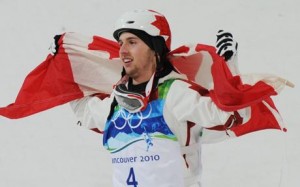 As Canadians across the country celebrated Alexandre Bilodeau’s freestyle moguls victory – the first Olympic gold won by a Canadian on home soil – the Australian delegation started to pour themselves a glass of fine whine.
As Canadians across the country celebrated Alexandre Bilodeau’s freestyle moguls victory – the first Olympic gold won by a Canadian on home soil – the Australian delegation started to pour themselves a glass of fine whine.
According to Dan Silkstone of the Sydney Morning Herald, the judges had put Bilodeau over Australian athlete Dale Begg-Smith who had to settle for silver to satisfy the Canadian hosts.
“It was the scores allocated to Bilodeau's turns - not traditionally his strong suit but Begg-Smith's undeniable strength - that had some in the Australian camp asking questions,” wrote Silkstone.
He then cited the Australian team’s high performance director, Geoff Lipshut: “My own opinion is probably that Alex is not capable of a 4.8 or 4.9 for turns. Just not capable.”
Lipshut did allow that Bilodeau out-paced Begg-Smith, an important criteria that judges always consider during competition.
“Dale could have been quicker,'' Lipshut said. “That's the bottom line: if Dale is three-tenths of a second quicker, Dale wins … You can say all the little things that you want, they are all small things. But you are probably not going to win by that. He had to be faster.”
So by the Australian delegation’s own admission, Bilodeau deserved to win, they’re just very disappointed. Silkstone, like many foreign journalists in Vancouver for the Olympics, are trying to make hay with Own the Podium and the Canadian Olympic Committee’s attempts to win as many medals as possible.
The British are also ragging on Canada’s Own the Podium program, but it comes across as just more bitterness. After all, what should Canada do? Not try to win? Not do their best? Nonsense.
Yes, Bilodeau’s win over Begg-Smith could be viewed by some as an upset, but thems the breaks. Sometimes underdogs come out on top.
Aside from some frustrated Aussies, no one has suggested that Bilodeau’s victory was anything less than legitimate.
Silkstone and his contacts on the Australian team are just chewing on sour grapes. At its core, the Olympics are about competition. Canada is finally stepping up its game and applying itself to winning as many medals as possible. Canadians can, and will, combine sportsmanship, class and athletic success at the Vancouver games.
